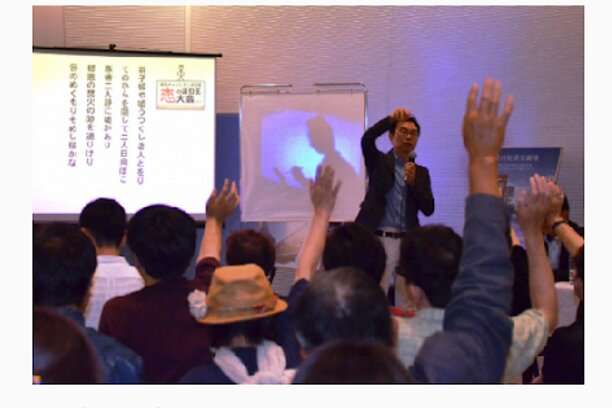Issa-kun, the artificial intelligence haiku poet

Associate Professor Tomohisa Yamashita and his colleagues at the Laboratory of Harmonious Systems Engineering (Harmo Lab, Faculty of Information Science and Technology) devote their research to artificial intelligence (AI) for the benefit of human happiness. One of their breakthroughs is the birth of Issa-kun, a haiku generator.
In 2017, the research team of the laboratory started a new project upon having received a peculiar challenge: to create an AI that can compose haiku verses. Haiku is a specific form of Japanese poetry consisting of 5-7-5 phonetic units (or syllables).
Issa-kun’s machine learning (language model) learns from a set of data registered in its system as “training data.” Some of the training data are taken from haiku of the old literary masters such as Kyoshi Takahama and Issa Kobayashi; the latter is the namesake of this AI. The early form of the model (Baby Issa-kun) analyzed the data in hiragana-only and produced phrases in hiragana in return, so some of the generated phrases were incoherent. The more advanced model (Adult Issa-kun) was introduced to kanji characters.
“However, there were still some flaws when we first introduced kanji. This is because the language changes over time. Some language aspects used by the old masters differ from our time,” said Yamashita. He took an example of an almost-obsolete kanji, 椛 (Momiji, Japanese maple), that once was used by Issa-kun.
Furthermore, Yamashita pointed out that when a person compose a haiku, they started out with the sentiment or message before moving on to selecting the words that best convey that. However, Issa-kun merely imitated the connections of the words from the training data. As a result, although Issa-kun can generate coherent phrases, not all have poetic value.

The research team was largely helped by the haiku communities. They further fed the training data from haiku created by contemporary poets by attending (and hosting) haiku gatherings and other haiku or poetry-related events. The participants also assessed Issa-kun’s verses; from this the research team can evaluate the model and remove unqualified verses.
In 2018, a television station offered the research team a chance to appear with Issa-kun on a television program. In this program, the AI was pitted against a human in creating a haiku. This propelled Issa-kun’s fine-tuning that eventually resulted in Issa-kun becoming able to generate thematic haiku derived from images—though human intervention is still needed to review their qualities.
The ubiquitous presence of AI in our lives invites polarizing attitudes and opinions; however, Yamashita believes that AI should be utilized as a tool to reach and improve human happiness. This also covers the subjects of art and literature—poetry included—which have the power to provoke human emotions.
“Just like other technologies, Issa-kun is a tool. For example, some modern musicians use synthesizer, in real musical instrument’s stead, to make good music. Issa-kun should be considered in such light. The combination of human creativity and Issa-kun’s ability should make original and good haiku. That is the kind of human-AI harmony that we wish to reach,” Yamashita commented.
Issa-kun is an ongoing collaboration with a Sapporo-based enterprise dealing with AI-related technologies and their promotion: Sapporo AI Lab. The laboratory is involved in multiple enterprise-academia collaborations, working on many other AI projects that can advance human life in different life aspects.
More information:
Sapporo AI Lab (in Japanese): www.s-ail.org/
Citation:
Issa-kun, the artificial intelligence haiku poet (2023, May 25)
retrieved 25 May 2023
from https://techxplore.com/news/2023-05-issa-kun-artificial-intelligence-haiku-poet.html
This document is subject to copyright. Apart from any fair dealing for the purpose of private study or research, no
part may be reproduced without the written permission. The content is provided for information purposes only.
For all the latest Technology News Click Here
For the latest news and updates, follow us on Google News.

